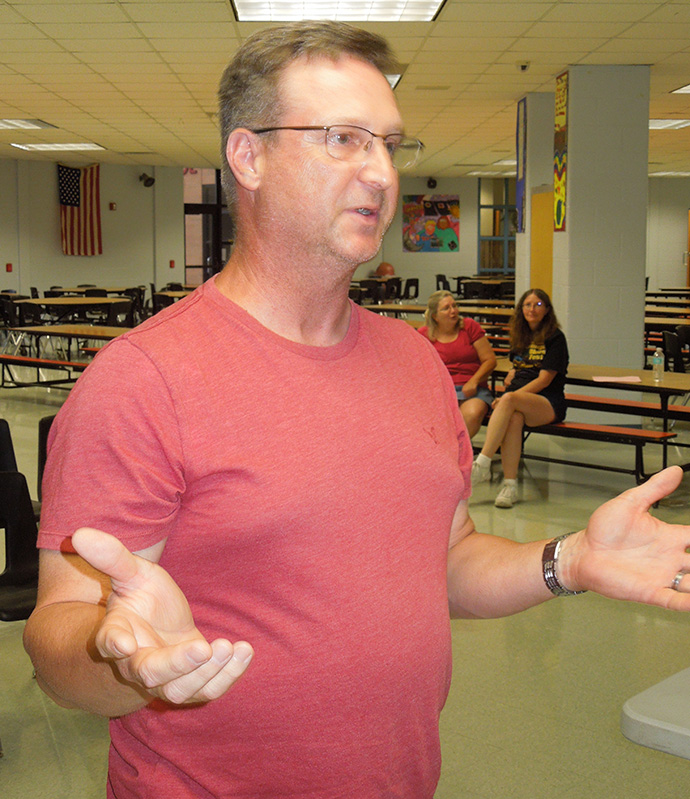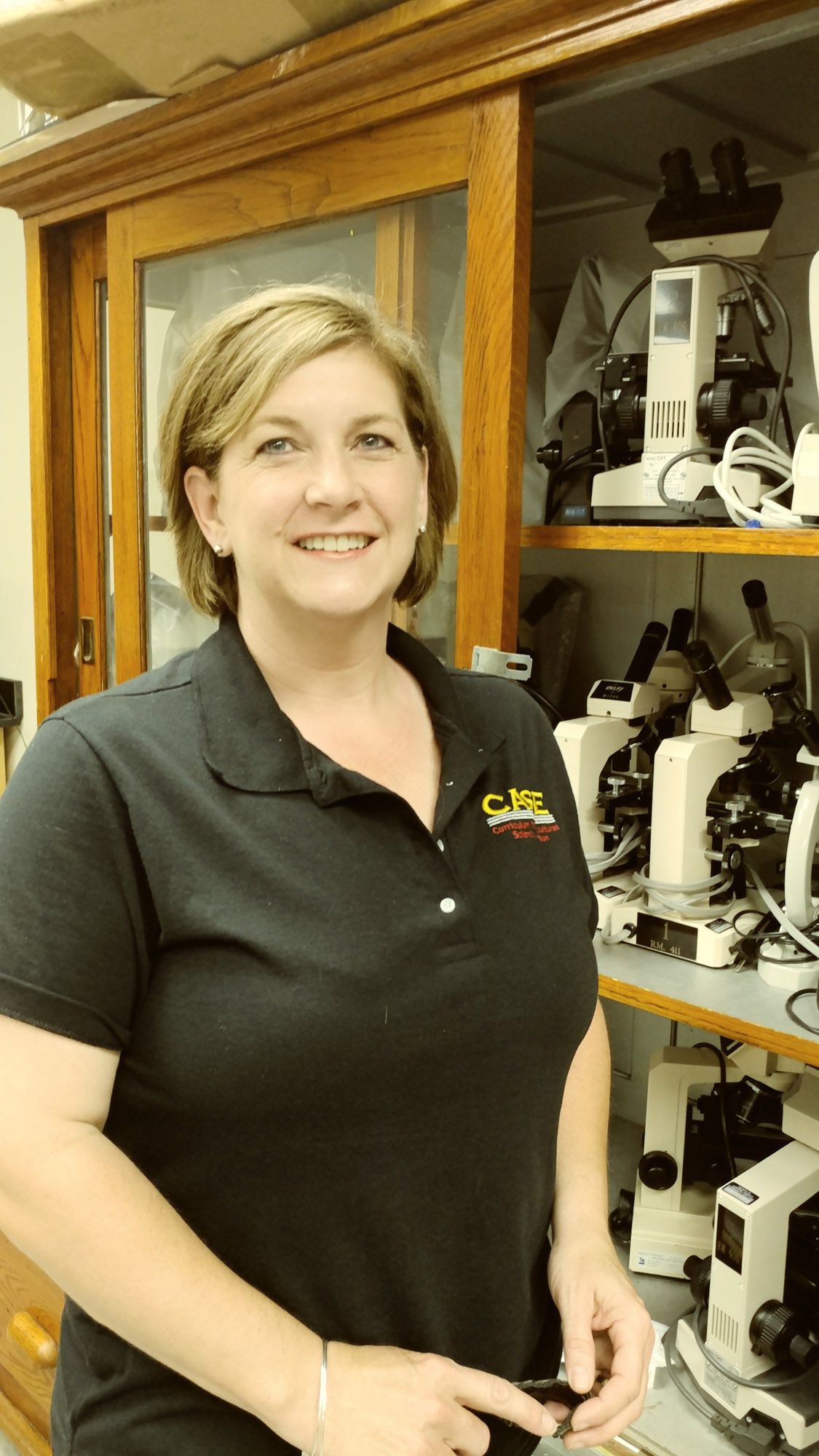At its August meeting on the 21st, in cooperation with the Susquehanna County District Attorney, the Blue Ridge School Board hired a “School Resource Officer” (SRO) by the name of Greg Deck. An SRO is in fact a law enforcement officer, a policeman. Mr. Deck will be armed, subordinate to the District Attorney’s office as a detective, and have the power to arrest.
Mr. Deck will wear 2 hats. A recently retired investigator with the Pennsylvania State Police, he is also a certified teacher. He will continue to function as a substitute teacher as needed, but will be available as the SRO during normal school hours. The whole package will cost Blue Ridge about $20,000 per year; Mr. Deck’s SRO salary of $17,670 ($95 per day, 186 days during the school year) will be paid by the county, but be reimbursed by the school district. The arrangement resulted from deliberatons between Blue Ridge, the county DA, and the county Commissioners.

Substitute teacher and School Resource Officer Greg Deck
According to School Board President Chris Lewis, High School/Middle School Principal Peter Supko will continue to have primary responsibility for discipline in the schools. Under the Memorandum of Understanding between the DA’s office and the district, Mr. Deck would handle more serious incidents, including weapons possession; acts of violence and gang activity; drug and alcohol activity; ethnic intimidation, harassment and stalking. In addition to his law enforcement responsibilities, he will be expected to provide security and offer education and crime prevention, collaborate closely with district administrators and faculty, and serve as a role model in the schools. He was welcomed in person at the meeting.
For their last session of the summer before school opens on August 28, the evening began with meetings of the Activities & Athletics committee, and the Facilities & Grounds committee.
Having resolved coaching salaries for the time being, the Athletics committee took on compensation for scorers and timers, and for ticket takers. It has been difficult to recruit for these jobs, and Blue Ridge pay for them has been lagging neighboring districts. The committee may recommend increases for scorers and timers from $28 to $45 per hour; and for ticket takers from $28 to $30 per hour.
The Facilities & Grounds committee heard a detailed report from Maintenance Supervisor Ron Cranage completing all tasks in preparation for the new school year. New LED lighting in the parking lots was a highlight; the upgrade should provide much better illumination at lower cost and require much less maintenance. Mr. Cranage said that the 6,000-gallon reserve water tank was cleaned and flushed for the first time in its long life; it is now scheduled to be done every 5 years.
Business Manager Brian Dolan recommended the acquisition of some storage containers. He said that with declining enrollment, there is an accumulation of spare furniture and no place to put it. “We’re completely out of storage,” he said. And Board member Edward Arnold asked that the district consider replacing playground equipment, perhaps next spring.
The full board finally assembled (attended for the first time by new Special Education Director, Casey Webster) – with the extra incentive of a fresh blueberry crumb cake provided by Food Service Manager Linda Cole-Koloski. Members first heard a brief report from David Wolfe, who attended a program at Villanova University in July focusing on science and technology. Mr. Wolfe hopes to pursue a career in artificial intelligence.

Future AI researcher David Wolfe
Board President Chris Lewis then recognized 13 “AP Scholars” who scored high on advanced placement exams. Two of them, Abby Hartman and Nicholas Folk, attended the meeting to receive certificates in person.

Scholars Abby Hartman and Nicholas Folk, with High School/Middle School Principal Pete Supko
And the Board heard from Samuel Scarantino, an architect with Quad3, the firm hired by the district to assess the district’s physical requirements. Mr. Scarantino said that he had toured the campus inside and out, and expects additional meetings with administrators and more detailed reviews before presenting a conceptual plan, possibly by late September. He said that his firm prefers to design a “comprehensive master plan” to define the scope of projects for the district to consider. He said that one possibility might be moving some of the hillside behind the schools to the lower campus to provide more parking while at the same time opening space for additional outdoor athletic space. It is already clear that handling water coming off the hill will be a major component of the plan, which the Board can review as budget resources allow.
Once Board members got to the formal meeting agenda, they quickly accepted most of the 23 items in a single motion. Among the more routine items, they approved a contract with Music Theatre International for the “Lion King Jr.” production. They approved a contract with NHS Pennsylvania for “students with autism and/or emotional disturbances” for the new school year as needed, with an accompanying detailed schedule of costs. They accepted an update to the agreement with the Blue Ridge Medical Center for medical services; the change was to include coverage for the new Athletic Director.
Board members also made their selections for officials of their lobbying organization, the Pennsylvania School Boards Association (PSBA). The 501 school districts around the state elect the PSBA officials each year from among candidates who come forward from among their number.
The Board gave final approval to changes to its Policy Manual offered for review earlier in the summer. These include primarily minor updates to bring policy language into line with recent legislation and regulations.
Another set of changes to the district’s policy manual is offered for a month’s review. Changes include:
- Adding the new Athletic Director to the organizational chart.
- Clarification of graduation requirements.
- Student responsibilities, to include behavior, dress, self expression.
- Handling of surveys for marketing and governmental purposes.
- Possession and use of electronic devices in the schools.
- Child custody issues.
- Hazing.
- Minor language changes throughout.
Oh, the antioxidants! Thanks, Linda.
The Harford Fair is this week. Classes begin promptly on Monday, August 28. But then there’s the Labor Day holiday.
The next public meeting of the Blue Ridge School Board is scheduled for Monday, September 5, 2017 beginning at 7:00pm in the cafeteria in the Elementary School.
A new agricultural sciences course at the Susquehanna Community High School aims to connect everyday chores some students take for granted with possible futures in agriculture, science and business.
A local example of a statewide effort at improving the way Pennsylvania schools provide agricultural related instruction to its students, a long term goal of the Intro to AFNR (Agric., Food & Natural Resources) course is to increase student involvement in one of Pennsylvania’s largest and oldest industries: Agriculture.
“They view that as just their way of life and they don’t see that as a career path. So I think opening their eyes to the opportunities in the agricultural field is part of the key,” said long term science instructor Carly Batzel, a local teacher for 23 years and a 1991 graduate.
 Susquehanna Community High School Science teacher Carly Batzel, wants to teach students how things they already know about agriculture can be turned into careers and businesses
Susquehanna Community High School Science teacher Carly Batzel, wants to teach students how things they already know about agriculture can be turned into careers and businesses
The development of the course and the few others like it across the state is significant as the state Department of Agriculture predicts that over the next decade the state will lose 75,000 agriculture workers because of a widening gap between the people who consume agriculture related products and the sources of those products: Farms.
The state Department of Agriculture believes that in order to fill those positions the state must have “ag literate” workers who understand and can communicate the source and value of agriculture. This has become more and more important because kids today are three to four generations removed from living and working on agriculture, said state Agriculture Secretary Russell C. Redding.
“At the department, we’re always trying to connect people to agriculture and to help them understand the origins of their food. That is more and more important as subsequent generations are further and further removed from agriculture,” Redding said.
At Susquehanna, Batzel explained, students need four sciences to graduate and many continue their educations into the engineering or medical and allied sciences fields. Typically, she says, those interested in engineering gravitate towards physics while those looking towards the medical fields take courses such as anatomy or biology. But others looking simply to fulfill their science requirement end up taking applied sciences. From that group she hopes to generate interest in agriculture related fields from daily tasks they’re familiar with, which they may not already realize involve an understanding of chemistry, sciences and technologies, all parts of small businesses or larger industries.
Making honey or maple syrup are two popular examples from Northeastern Pennsylvania, said Batzel, the daughter of a local dairy farmer.
“Most of the kids see it as an art that’s been handed down generation to generation because that’s how Grandpa did it and Grandpa did it that way because that’s how his dad taught him to do it. Because it’s just a way of life for them they lose the application, they lose the technology, or the technical side of it,” said Batzel.
Two projects Batzel’s course will tackle involve students designing a coldframe – basically a small scale, personal sized greenhouse in which students can grow a garden during winter – and building a hydroponic or aqua culture system incorporating vegetables and fish as part of a farm to table system.
“You are actually doing a STEM (Science, Technology, Engineering, Mathematics) career if you’re in science and agriculture and that’s something that I want them to see,” Batzel said.
Batzel’s local efforts are mirrored by a statewide move in improving agriculture education. Peculiarly, despite Pennsylvania’s deep roots in agriculture, of the approximately 500 school districts across the state, only about 150 offer ag science courses. This becomes particularly poignant in rural, agriculturally oriented communities such as Susquehanna County, said state Rep. Mark Keller (R-86th), who has introduced legislation to help teachers like Batzel.
Keller’s House Bill 944 seeks to amend the state school code and create the Commission of Agricultural Education Excellence which would streamline the way agricultural education is provided in Pennsylvania. Keller, who represents constituents in the Perry and Cumberland Counties area, is the vice chairman of the House Agriculture and Rural Affairs Committee.
One object is to get educators and those in the agricultural and business communities on the same page in terms of what is being taught.
“What we’re doing is putting a board together to actually identify a curriculum the agriculture teachers can look to and work from,” Keller said.
Another issue, Keller explained, is that in Pennsylvania school districts have no financial incentive to establish Ag Science courses as they do not receive state reimbursement credits for them like they do with more traditional courses such as math or history.
“This will give them credits once it’s established,” Keller said.
The House passed the bill earlier this year and it is awaiting consideration by the Senate. Keller said he expected it would be presented to Governor Wolf by the end of the year.
Bridget O’Neill, Susquehanna’s school counselor, thinks the course will give students more information on the career choices she discusses with them every day.
“I think it gives them more information, it gives them more knowledge that they might not already have and it gives them more resources of what’s available in their community instead of traveling out of the area,” O’Neill said.
But even at Susquehanna, she says, not all that many are expressing a true interest in pursuing careers in agriculture.
Out of 300 students of the 7th to 12th grade students she handles, O’Neill says that only 10 may express any interest.
“Very few. I’m not saying none. But it’s few,” O’Neill said.
Neil Fellenbaum, the president of the Pennsylvania Association of Agriculture Educators, emphasized the importance of courses like Batzel’s but lamented the shortage of agriculture education certified teachers statewide.
“Agriculture education has been around for a while and it certainly is a great vehicle for students to learn some career skills that will make them very employable. It’s the school district’s choice whether they have the agriculture program or not. Obviously, where agriculture is more prominent you’re going to see some of those schools,” Fellenbaum said.
Fellenbaum said that there is less than one agriculture education certified teacher per school in Pennsylvania.
“One of the bigger challenges is that there there’s not many of them around,” he said.
“I think we need to continue to work with all the stakeholders in agriculture to make sure that people understand that it is a necessity and that there are viable careers in agriculture and that it is important,” Fellenbaum said.
“This is an extraordinary time to be in agriculture,” the Department of Agriculture’s Redding said. “There is rediscovery happening among consumers when it comes to food, and that is opening up enormous opportunities for businesses. It’s exciting to learn that Ms. Batzel is engaged in the conversation about how we reach our fullest potential by teaching our youth about agriculture,” Redding said.


















